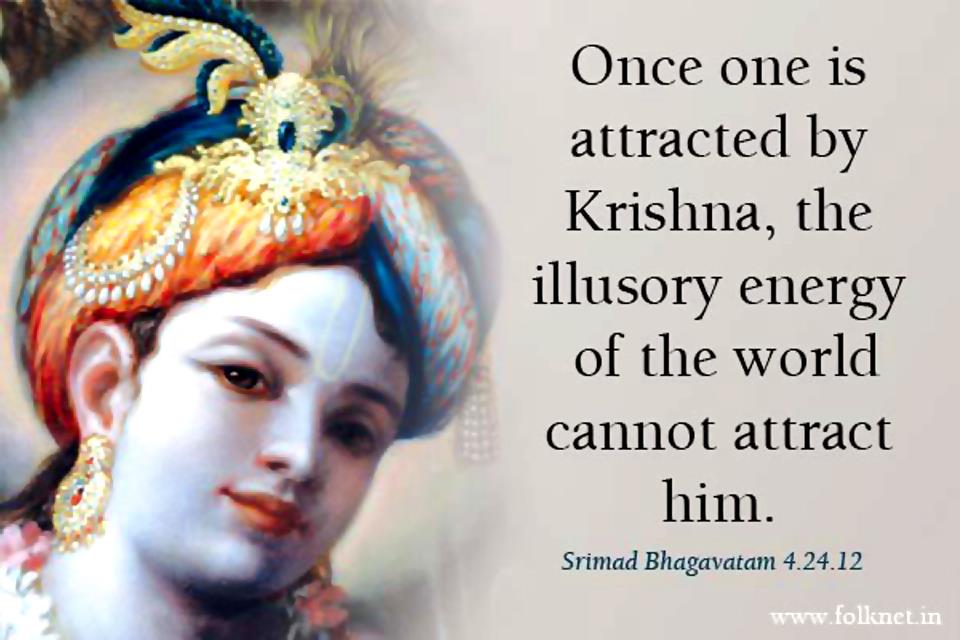 The Path of Perfection, Chapter Three: […] In Brahma-samhita it is stated, isvarah paramah krsnah sac-cid-ananda-vigrahah [Bs. 5.1]: “The supreme controller is Krishna, who has an eternal, blissful, spiritual body.” This is the Vedic pronouncement, and we thus accept Sri Krishna as the Supreme Lord. Those who are in the modes of passion and ignorance attempt to imagine the form of God, and when they are confused, they say, “Oh, there is no personal God. God is impersonal, or void.”
The Path of Perfection, Chapter Three: […] In Brahma-samhita it is stated, isvarah paramah krsnah sac-cid-ananda-vigrahah [Bs. 5.1]: “The supreme controller is Krishna, who has an eternal, blissful, spiritual body.” This is the Vedic pronouncement, and we thus accept Sri Krishna as the Supreme Lord. Those who are in the modes of passion and ignorance attempt to imagine the form of God, and when they are confused, they say, “Oh, there is no personal God. God is impersonal, or void.”
This is just the result of frustration. Actually, God has His form. And why not? According to the Vedanta-sutra, janmady asya yatah: [Bhag. 1.1.1] “The Supreme Absolute Truth is He from whom everything emanates.” It is easy to see that we have different types of bodies, different types of forms. We must consider where these forms are coming from.
Where have these forms originated? We have to use a little common sense. If God is not a person, how can His sons be persons? If your father is just a void, if he is not a person, how can you be a person? If your father has no form, how can you have form? This is not very difficult; it is just a common sense question.
Unfortunately, because people are frustrated, they try to imagine some form, or they conclude that because this material form is temporary and troublesome, God must be formless. Indeed, because all forms in this material world must perish, God, of necessity, must be formless.
Brahma-samhita specifically states that this conception is a mistake. Isvarah paramah krsnah sac-cid-ananda-vigrahah [Bs. 5.1]. God has form, but His form is sac-cid-ananda-vigraha. Sat means “eternal,” cit means “knowledge,” and ananda means “pleasure.”
God has form, but His form is eternal and is full of knowledge and pleasure. We cannot compare His form to our form. Our form is neither eternal, full of pleasure, nor full of knowledge; therefore God’s form is different.
As soon as we speak of form, we think that form must be like ours, and we therefore conclude that the eternal, all-knowing, and all-blissful God must be without form. This is not knowledge but the result of imperfect speculation.
According to Padma Purana, atah sri-krsna-namadi na bhaved grahyam indriyaih: [BRS. 1.2.234] “One cannot understand the form, name, quality, or paraphernalia of God with one’s material senses.” Since our senses are imperfect, we cannot speculate on Him who is supremely perfect. That is not possible.
Then how is it possible to understand Him? Sevonmukhe hi jihvadau. By training and purifying our senses, we may come to understand and see God. Presently we are attempting to understand God with impure, imperfect senses.
It is like someone with cataracts trying to see. Just because one has cataracts, he should not conclude that there is nothing to be seen. Similarly, we cannot presently conceive of God’s form, but once our cataracts are removed, we can see. According to Brahma-samhita, premanjana-cchurita-bhakti-vilocanena santah sadaiva hrdayesu vilokayanti: [Bs. 5.38] “The devotees whose eyes are anointed with the ointment of love of God can see God within their hearts twenty-four hours a day.”







Speak Your Mind